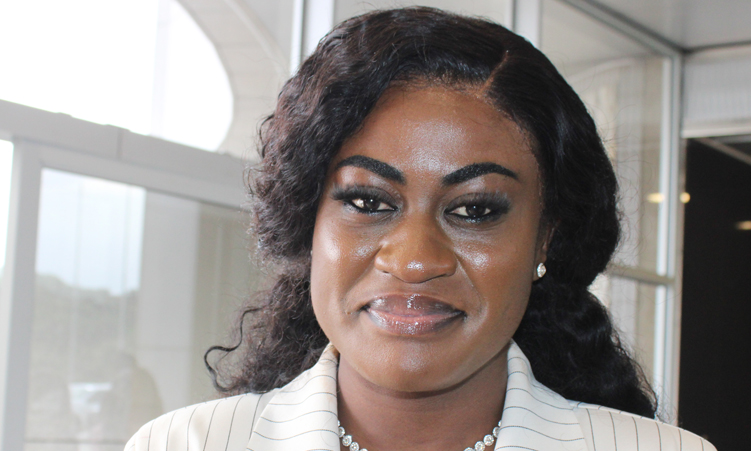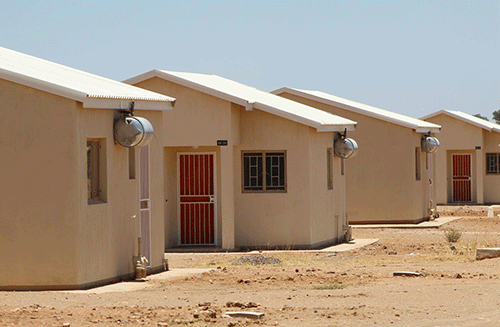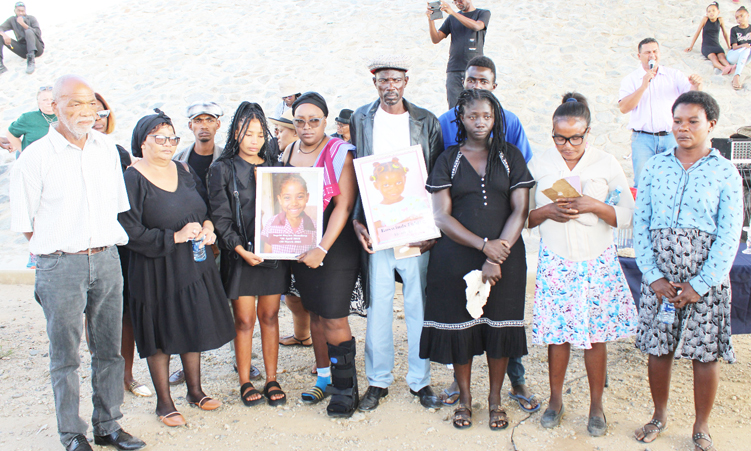THE absence of both defence lawyers and the 12 accused people themselves from the second Caprivi high treason trial raises doubts about the fundamental fairness of this trial, the National Society for Human Rights has warned.
The trial – the second such legal proceedings against people accused of being part of an alleged conspiracy to take up arms to force the secession of the Caprivi Region – has increasingly been turning into the unruly little brother of the main Caprivi high treason trial that has been in progress before Judge Elton Hoff since August 2004. The trial is now set to continue from October 16, after courtroom upheavals marked its most recent week of proceedings and resulted in seven prosecution witnesses testifying before Acting Judge John Manyarara in the absence of the 12 accused, and as a result without any aspects of their evidence being challenged by any of the accused.The unusual situation that played out as the trial proceeded in the absence of the 12 men arose after a round of singing of a claimed Caprivi nationalist song and shouting of political slogans while the court was in session first prompted Acting Judge Manyarara to convict them of contempt of court.After a defiant repeat performance from the dock, Acting Judge Manyarara ordered the removal of the 12 from the courtroom.Two days later, they were brought back into court one by one, with Acting Judge Manyarara reading to each of them an explanation that in terms of the Criminal Procedure Act the court could order that the trial continue in their absence if they by their conduct – such as singing during proceedings – made the continuance of the trial impossible.He also asked – or tried to ask – each of them what they planned to do next and if they wanted to remain present during further proceedings or not.Again some of the 12 – such as Shine Samulandela, Hoster Ntombo and Alex Mafwila Liswani – started singing in court, prompting Acting Judge Manyarara to once more order their removal from the court.Others complained about having previously been ordered out of court, or – like the tenth accused, Boster Samuele – told the Acting Judge that they would only be prepared to again appear in court if they had been provided with legal representation again.None of the 12 is being represented by a lawyer any more.The two defence counsel who previously represented them, Nate Ndauendapo and Zagrys Grobler, withdrew from the trial in early July, citing a breakdown in relations with their clients.In the last week of the trial, the 12 told Acting Judge Manyarara that they still wanted to be legally represented – but that this would not be for the criminal trial that was in progress as such, but rather so that a legal challenge could be pursued through which they want to convince the court that the Caprivi is not legally part of Namibia, and is in fact under illegal occupation by the Namibian Government.The Directorate of Legal Aid, which previously instructed Ndauendapo and Grobler to represent the 12, has however not been prepared to instruct defence counsel to represent the 12 for such a purpose of questioning the historical and legal ties of the Caprivi Region with Namibia.”(The) NSHR is concerned about the prospects of unfairness in very serious criminal proceedings in which an accused is denied, either by commission or omission, the fundamental and intrinsic right to defend himself or herself,” the human rights organisation has now commented in a media statement.While Namibia’s Constitution guarantees the right to a fair trial in an independent, impartial, competent and lawful court, the right to have legal representation at a trial is further guaranteed not only by the Constitution, but also by the International Covenant on Civil and Political Rights, the African Charter on Human and Peoples’ Rights, the American Convention on Human Rights and the European Convention for the Protection of Human Rights and Fundamental Freedoms, the NSHR stated.Every person charged with a criminal offence must be accorded the full right to enlist the assistance of a legal counsel of his or her own choice, NSHR Executive Director Phil ya Nangoloh was quoted as commenting.”Accordingly, the right to legal counsel paid for by the Namibian State cannot and should not be denied even if the 12 accused were to argue that Caprivi is not part of Namibia.A trial must not only be fair, but it must also be seen to be fair,” Ya Nangoloh stated.The minimum guarantees for a fair trial include not only the right to be defended by a lawyer of one’s choice, but also the right of an accused to be tried in his presence, the NSHR added.In the second high treason trial, the risks the 12 accused face through not being present during proceedings and not having defence lawyers present were already evident in the form of some of the exhibits that have become part of the evidence through the testimony of some of the recent, unchallenged State witnesses.Amongst these exhibits are four AK47 rifles that, according to what the court was told, were found at a suspected base that a group of armed separatists had at Situnga Island near the Kwando-Linyanti River in the Caprivi.The firearms were allegedly found at that base on November 4 2002 after a Namibia Defence Force patrol group was involved in a fire fight with armed separatists at Situnga.Four of the alleged separatist fighters were killed during the incident, and two – allegedly Alex Mafwila and Boster Samuele – made an escape, it is claimed.The trial is now set to continue from October 16, after courtroom upheavals marked its most recent week of proceedings and resulted in seven prosecution witnesses testifying before Acting Judge John Manyarara in the absence of the 12 accused, and as a result without any aspects of their evidence being challenged by any of the accused.The unusual situation that played out as the trial proceeded in the absence of the 12 men arose after a round of singing of a claimed Caprivi nationalist song and shouting of political slogans while the court was in session first prompted Acting Judge Manyarara to convict them of contempt of court.After a defiant repeat performance from the dock, Acting Judge Manyarara ordered the removal of the 12 from the courtroom.Two days later, they were brought back into court one by one, with Acting Judge Manyarara reading to each of them an explanation that in terms of the Criminal Procedure Act the court could order that the trial continue in their absence if they by their conduct – such as singing during proceedings – made the continuance of the trial impossible.He also asked – or tried to ask – each of them what they planned to do next and if they wanted to remain present during further proceedings or not.Again some of the 12 – such as Shine Samulandela, Hoster Ntombo and Alex Mafwila Liswani – started singing in court, prompting Acting Judge Manyarara to once more order their removal from the court.Others complained about having previously been ordered out of court, or – like the tenth accused, Boster Samuele – told the Acting Judge that they would only be prepared to again appear in court if they had been provided with legal representation again.None of the 12 is being represented by a lawyer any more.The two defence counsel who previously represented them, Nate Ndauendapo and Zagrys Grobler, withdrew from the trial in early July, citing a breakdown in relations with their clients.In the last week of the trial, the 12 told Acting Judge Manyarara that they still wanted to be legally represented – but that this would not be for the criminal trial that was in progress as such, but rather so that a legal challenge could be pursued through which they want to convince the court that the Caprivi is not legally part of Namibia, and is in fact under illegal occupation by the Namibian Government.The Directorate of Legal Aid, which previously instructed Ndauendapo and Grobler to represent the 12, has however not been prepared to instruct defence counsel to represent the 12 for such a purpose of questioning the historical and legal ties of the Caprivi Region with Namibia.”(The) NSHR is concerned about the prospects of unfairness in very serious criminal proceedings in which an accused is denied, either by commission or omission, the fundamental and intrinsic right to defend himself or herself,” the human rights organisation has now commented in a media statement.While Namibia’s Constitution guarantees the right to a fair trial in an independent, impartial, competent and lawful court, the right to have legal representation at a trial is further guaranteed not only by the Constitution, but also by the International Covenant on Civil and Political Rights, the African Charter on Human and Peoples’ Rights, the American Convention on Human Rights and the European Convention for the Protection of Human Rights and Fundamental Freedoms, the NSHR stated.Every person charged with a criminal offence must be accorded the full right to enlist the assistance of a legal counsel of his or her own choice, NSHR Executive Director Phil ya Nangoloh was quoted as commenting.”Accordingly, the right to legal counsel paid for by the Namibian State cannot and should not be denied even if the 12 accused were to argue that Caprivi is not part of Namibia.A trial must not only be fair, but it must also be seen to be fair,” Ya Nangoloh stated.The minimum guarantees for a fair trial include not only the right to be defended by a lawyer of one’s choice, but also the right of an accused to be tried in his presence, the NSHR added.In the second high treason trial, the risks the 12 accused face through not being present during proceedings and not having defence lawyers present were already evident in the form of some of the exhibits that have become part of the evidence through the testimony of some of the recent, unchallenged State witnesses.Amongst these exhibits are four AK47 rifles that, according to what the court was told, were found at a suspected base that a group of armed separatists had at Situnga Island near the Kwando-Linyanti River in the Caprivi.The firearms were allegedly found at that base on November 4 2002 after a Namibia Defence Force patrol group was involved in a fire fight with armed separatists at Situnga.Four of the alleged separatist fighters were killed during the incident, and two – allegedly Alex Mafwila and Boster Samuele – made an escape, it is claimed.
Stay informed with The Namibian – your source for credible journalism. Get in-depth reporting and opinions for
only N$85 a month. Invest in journalism, invest in democracy –
Subscribe Now!










